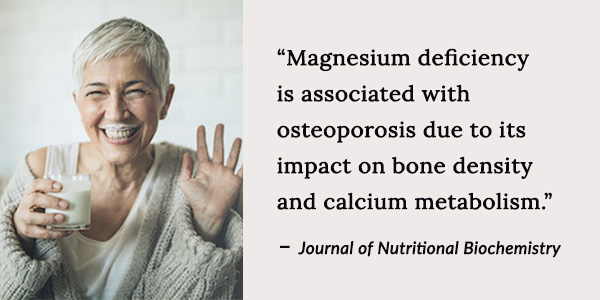Authored by Dr. Susan E. Brown, PhD
Magnesium is one of the most essential minerals in the human body — and for good reason. It plays a role in more than 300 enzymatic reactions, supports healthy muscles and nerves, and even helps regulate your stress response. For women looking to protect their bones and age vibrantly, magnesium is a true powerhouse.

But one of the most common questions we get is: When should I take it?
For most people, the ideal time to take magnesium is in the evening. That’s because magnesium has a natural calming effect on the body. It helps relax muscles, soothe overactive nerves and even assists in controlling cortisol, the hormone released in response to stress. This makes magnesium a great ally if you have trouble winding down at night or struggle with sleep. Taken before bed, magnesium can help ease you into restful, restorative sleep — something that’s vital for bone health and overall well-being.
A typical starting dose is 200–300 mg at night. But many women find that they need more than that to feel their best and achieve key wellness markers. A good way to measure your progress with magnesium is by checking your first morning urine pH. If your testing strip shows a pH between 6.5 and 7.5, that’s a good sign that your body has successfully buffered excess acidity overnight — and magnesium plays a central role in that buffering process.
If your pH is still too acidic in the morning, you might benefit from increasing your magnesium intake to 400, 500 or even 600 mg per day. Just be sure to divide larger doses. Taking magnesium with meals throughout the day — along with your evening dose — can improve absorption and reduce the risk of loose stools (a common side effect of taking too much magnesium at once).
Magnesium also supports healthy bones by helping to regulate calcium metabolism. Without enough magnesium, calcium can’t be properly transported or utilized in the body. That’s why we often say magnesium and calcium are nutrient partners. They work together to maintain the structure and strength of your bones.
If you’re not sure how much magnesium you need, start low and go slow. Track your symptoms, your sleep quality and your pH levels to see how your body responds. Look for forms of magnesium that are gentle on digestion, like magnesium glycinate, citrate or malate.
Magnesium Bisglycinate is especially well tolerated and highly absorbable, making it an excellent choice for women with sensitive digestion or those looking for a calming, sleep-supportive form of magnesium. It’s bound to glycine, an amino acid known for promoting relaxation and easing tension, which makes this form ideal for evening use and stress management. Many women also find it causes fewer digestive side effects, such as loose stools, compared to other forms.










